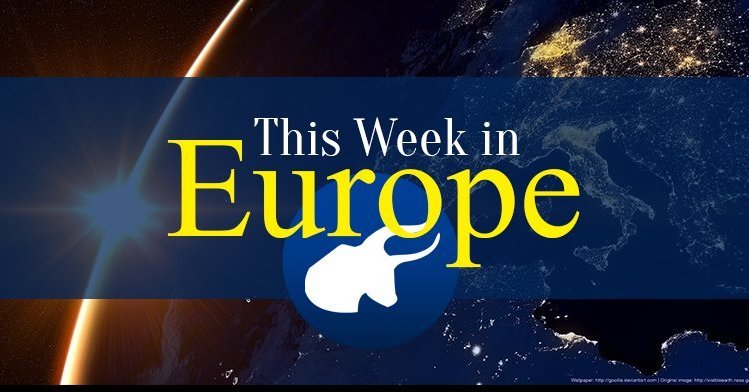Survey: Vast majority of people support the euro
This week, a Eurobarometer survey found that a vast majority of people in the eurozone support the common currency of the EU - the euro. Out of the 19 countries, Ireland Luxembourg, Slovenia, and Spain are the leaders, with 80% of inhabitants saying that the euro is a good thing for their country - with Italy, Belgium and France at the bottom. Overall, however, 64% of people think that the euro is a positive thing. The same survey showed that only 15% of people convert prices and amounts in the old national currencies.
Spanish PM visits Cuba for the first time in 32 years
Between Thursday and Friday, PM Pedro Sanchez was the first Spanish official to visit Cuba in 32 years, as Cuba is looking to Europe for new ties. Traveling with ministers and heads of companies, Sanchez aims to strengthen commercial relations with the island. The last time a Spanish leader visited Cuba was in 1986 when social democrat Felipe Gonzalez stepped foot in the Caribbean island. Sanchez met with president Miguel Diaz-Canel, Raul Castro’s successor, but not with dissidents, which Cuba views as US-paid mercenaries, nor with opposition leaders. Instead, the leader of Cuba’s third largest trading partner preferred to meet with intellectual dissenters like journalists and think tank analysts, and also members of the nascent private sector.
Macron: Two or three-speed Europe would hasten integration
French president Emmanuel Macron spent the entire week on a European tour, starting with Berlin and Brussels. In a talk with Belgian PM Charles Michel in front of 1000 students of the Catholic University of Louvain, Macron spoke of a confrontation between pro-European leaders and “nationalists and demagogues.” He warned against the looming danger of Marine Le Pen in the next European elections and finally pleaded for a “two or three speed Europe” that would allow a deeper integration between a few core countries. Macron argued that unanimity voting should no longer stop EU’s progress and that not everything can be decided among 27 countries. “We should also keep in mind that whoever is against can no longer block the others,” Macron said.
Paris rocked by demonstrations against fuel prices
On Saturday, French police had to fire tear gas and make use of water cannons in order to disperse groups of protesters demonstrating against rising fuel prices. The “yellow jacket” (gilets jaunes) activists, named after the vests worn by motorists during roadside emergencies, protested against the plan of president Macron for raising taxes on gas. On a descending trend in opinion polls, Macron has been attempting to shift the blame for the tax onto rising global prices. In response, far-right and far-left extremists took over the protest and went on to incite to violence. With some 30,000 protesting across France, people were shouting “Macron, thief” while setting vehicles on fire. On Friday, police also detained a man wearing an explosive device who was demanding an audience with Macron for the yellow jacket activists.
Polish government backtracks on judicial changes
The populist government in Poland has moved back from its controversial changes to the judiciary. A previous piece of legislation that aimed to force the retirement of Supreme Court judges and give the government the opportunity to pack the court with its supporters has been stopped. The move was largely in response to an injunction from the European Court of Justice against the law. Though there was some suggestion that the Polish populists would simply ignore the ruling, for now, they appear to have backed down on at least one part of their programme.
EU states push ahead with new military cooperation projects
As part of PESCO (Permanent Structured Cooperation), 25 EU states announced a slate of new projects. The defense ministers of the countries involved sign off on a joint EU intelligence school along with 16 other projects, including drone creation, cybersecurity, satellite navigation, and chemical surveillance. The EU’s intelligence community is expected to take a big step forward thanks to the establishment of the new spy school. The UK had recently blocked this kind of integration as it was seen as a threat to the Five Eyes intelligence alliance. Brexit means the EU will now be able to progress in this field.
Germany imposes travel bans on Saudis
18 Saudi nationals who are believed to be connected to the murder of journalist Jamal Khashoggi have had travel bans imposed on them by Germany. This decision will affect the ability of these people to travel anywhere in the Schengen area and the action was coordinated with France and the UK.
Poland backs forest expansion
In the lead up to the annual UN climate talks due to be held in Warsaw next month, the Polish government has called for more forests to be planted as a way of capturing carbon emissions and helping to tackle global warming. Poland’s position as host for the talks has been controversial given the country’s use of high-polluting coal and the populist government’s disputes with the EU over increased logging in the Białowieża Forest. Though one-third of Poland is forested and the government is itself planting more trees, there was a big conflict over logging in the ancient Białowieża Forest, which the government had not marked for protection. Following an ECJ ruling that found Poland in breach of its obligations, the government dismissed the minister in charge of logging and halted logging in that forest.
Interpol picks South Korean chief in blow to Russia
Interpol has chosen Kim Jon Yang as its new president for the next two years after an international campaign against his Russian rival, Alexander Prokupchuk. There was great concern among Western countries, particularly that Prokupchuk, who is closely linked to Russian President Putin, could weaken the integrity of the international policing organization. Russia has been regularly accused of using the “red notice” system in order to harass and intimidate political opponents of the Russian regime around the world. Kim Jon Yang has been serving as Interpol’s interim chief since the disappearance and then resignation of Men Hongwei, the former president, who was detained in China last month.
EU backs draft Brexit agreement
This week, EU ministers and leaders have given their support for both the draft Withdrawal Agreement and the Political Declaration on the Future Relationship. Though last minute concerns from Spain and France around the Withdrawal Agreement were raised, these were put aside and sufficient solutions found through the Political Declaration. At this point, the EU has presented a united position that the agreement is final, that negotiations will not be reopened and that it is up to the UK to decide whether to accept it. Though the draft agreement has received a highly mixed and often strongly negative response in the UK, EU ministers have repeated that this deal is as far as they can go.


Follow the comments: |
|
